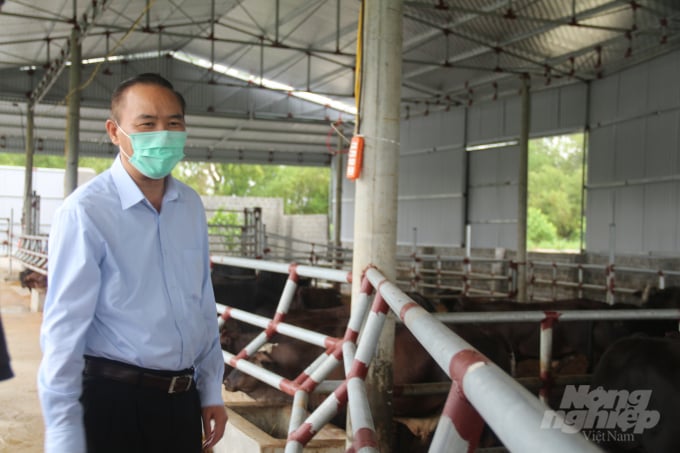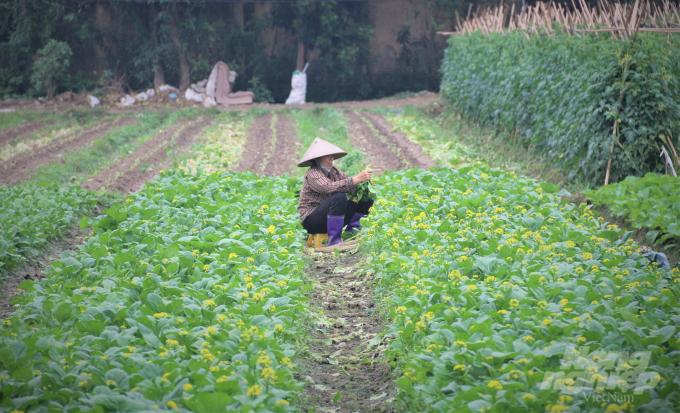November 27, 2025 | 19:34 GMT +7
November 27, 2025 | 19:34 GMT +7
Hotline: 0913.378.918
November 27, 2025 | 19:34 GMT +7
Hotline: 0913.378.918

Deputy Minister Phung Duc Tien said that in order to increase the added value of agricultural products, food safety is a key factor. Photo: Pham Hieu.
In modern society and the increasing integration of Vietnam into the global economy, food safety has been a vital issue directly relating to the quality of people’s life. Besides, it also plays an integral part in socio-economic development.
To improve the added value as well as strengthening the competitiveness of agricultural products in the domestic and international market, ensuring food safety is the key factor. Acknowledging the importance of the task, MARD cooperated with World Bank to deploy the Agri-Food Safety Project (AFSP) aiming to improve food safety management systems and infrastructure in target, responding to Vietnam’s demands of development and economic integration.
This project on food safety is also one of the issues with special attention in the 14th session of the 12th-tenure Party Central Committee (PCC).
The project will be implemented within the scope of the Ministry of Agriculture and Rural Development (MARD) and the People's Committees of the provinces of Hanoi, Thanh Hoa, Ho Chi Minh City, An Giang, Tien Giang, and Dong Thap in the expected time from 2022 to 2027 with total estimated capitals of about USD 343.48 million.
Of which, concessional loans are USD 211.17 million, accounting for 61.6% of total capital. The expected non-refundable capital of USD 6 million managed by the MARD accounts for 1.75% of the total capital.
Domestic counterpart capital is USD40.36 million, making up 11.8% of total capital. And private capital is USD 85.42 million, accounting for 24.9% of total capital.

A clean vegetable farm in Trang Viet commune, Me Linh district, Hanoi. Photo: Pham Hieu.
MARD is projected to implement the project in four components. The first component is a pilot investment in a system of modern national agricultural product trading centers. The second is the modernization of the national safe agri-food value chain management infrastructure. The third is applying technology, perfecting institutions and national policies on food safety and the last is project management.
Deputy Minister of MARD Phung Duc Tien stressed that the progress of the project is very important. So far, the basic content of the project has been developed methodically, the provinces participating in the project need to soon complete their work according to the assigned schedule and at the same time highly agree on the contents to accompany the World Bank.
Commenting on the role of agricultural food safety in Hanoi, Deputy Minister Phung Duc Tien said that the Vietnam Agri-Food Safe Project played an important meaning in the development of the economy and the capital's society, while also creating favorable conditions for neighboring provinces to develop.
“Hanoi is a city with a particularly substantial location and administrative area, with a population of over 13 million people, although there have been many agricultural production chains, the output is still limited, the externalities are still low. In addition, the infrastructure is still in shortage. Therefore, the city should pay close attention to this project. MARD and the Management Board of Agricultural Projects will provide maximum support to the city", Deputy Minister Phung Duc Tien affirmed.

(VAN) After the institutional merger, Da Nang possesses significant forest-carbon reserves and is proactively engaging in the carbon market, creating a new revenue stream.

(VAN) An Giang strengthens communication against IUU fishing, increases inspections and sanctions, and is determined to remove the EC’s “yellow card” while developing a sustainable fisheries sector.

(VAN) As green transition becomes a global trajectory, Viet Nam’s biggest challenge is not only technology and models, but how to ensure that capital flows reach the right beneficiaries.

(VAN) The Ministry of Agriculture and Environment must spearhead the construction of green governance, spanning decision-making processes and investment standards to policy evaluation mechanisms.

(VAN) The Agriculture and Environment sector of Khanh Hoa has achieved numerous milestones over the past 80 years, contributing significantly to the goal of establishing the province as a centrally governed city by 2030.

(VAN) Viet Nam is entering the pivotal period of 2025-2030, moving toward the formulation of the Remote Sensing Law, which will establish a legal foundation for the development of national digital data.

(VAN) The agricultural sector is finalizing the strategic framework for emission reduction, setting the goal of sharply cutting methane and 403.7 million tons of CO2 equivalent and moving toward Net Zero by 2050.